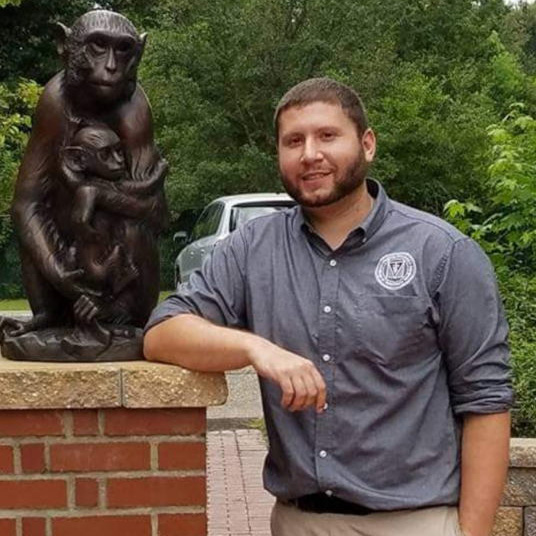Gianni Campellone, DVM, MS

"As a child of a veterinarian I was immersed in veterinary medicine from an early age. I joke that I attended my first vet class when I was four years old. I’ve always wanted to work with a variety of species, and I entered undergrad with the hopes of working in a zoo.
"After undergrad, I completed a master’s program in laboratory animal science. This was my first taste of biomedical research, but I was using this degree more as a stepping stone to vet school, rather than a career move. When I first started at VMCVM, my plan was to pursue zoo medicine, but in the back of my mind there was a small part of me that considered a career as a laboratory animal vet. During the summer between my second and third year of vet school I interned at the Tulane National Primate Research Center. I took this internship because I figured whether I ended up in zoo medicine or lab animal medicine I would have to work with nonhuman primates, and up until that point I had no previous experience with them. After those 9-weeks I was hooked. I fell in love with biomedical research and “monkey medicine”.
"As a public-corporate track student, I was fortunate to have an enriching clinical year experience. I spent 27 weeks externing at various host institutions. I mainly focused on laboratory animal medicine, but I also sprinkled some zoo medicine rotations into the mix. My most memorable externship experience is a toss-up between getting to scrub in and assist with a cesarean section of an owl monkey or performing an enucleation on a screech owl!
"Following my time at VMCVM, I completed a one year internship in the medicine and management of nonhuman primates at the Mannheimer Foundation in Florida. I then secured a residency position at Emory University in Atlanta, GA. I spent my first year of residency at the Yerkes National Primate Research Center, and now as a second year resident I’m at Emory’s school of medicine working with all of the traditional lab animal species; rodents, rabbits, pigs, fish, etc. After my residency I will complete a one year fellowship back at Yerkes, before I hopefully sit for ACLAM boards in the summer of 2023.
"For those students considering a career in veterinary public practice, I really can’t encourage you enough. There are so many veterinary opportunities that exist aside from a traditional private practice setting. For a public practice veterinarian, the world truly is your oyster. You can forge your own path while still fulfilling a passion of working with animals. I choose a career in laboratory animal medicine, because I believe in a one health approach, and I know through my work I am helping to better the lives of both animals and humans. For any student considering a career in lab animal medicine, the public corporate track is the way to go. In lab animal medicine, connections are super important, as it’s a very small field. Everyone knows everyone. The external clerkship opportunities offered to Public-Corporate students really give them an edge when it comes time to apply for residencies. Furthermore, a huge component of a lab animal vet’s job deals with laws and regulations. The knowledge you receive in Public-Corporate courses lays a nice foundation from which to build on during formal training programs."


